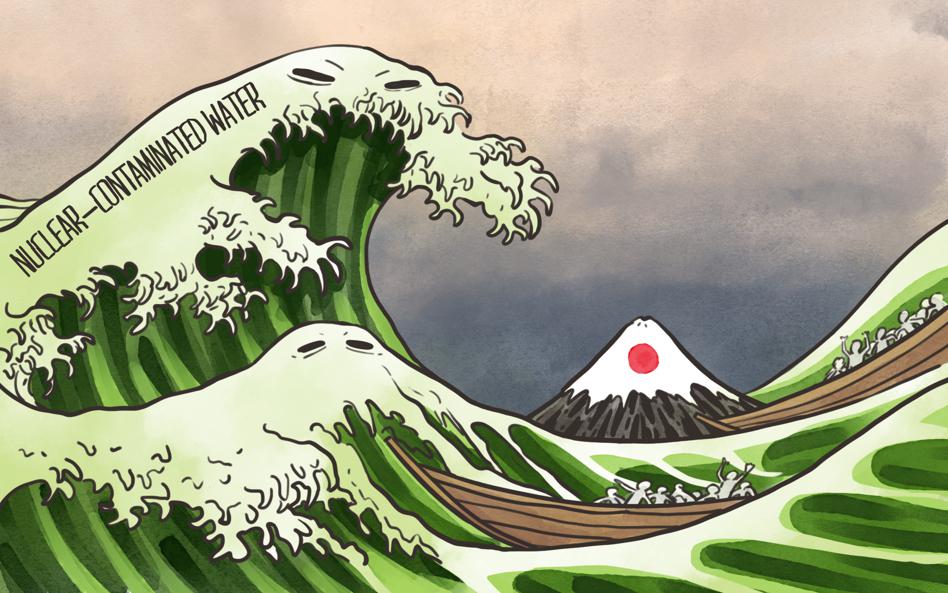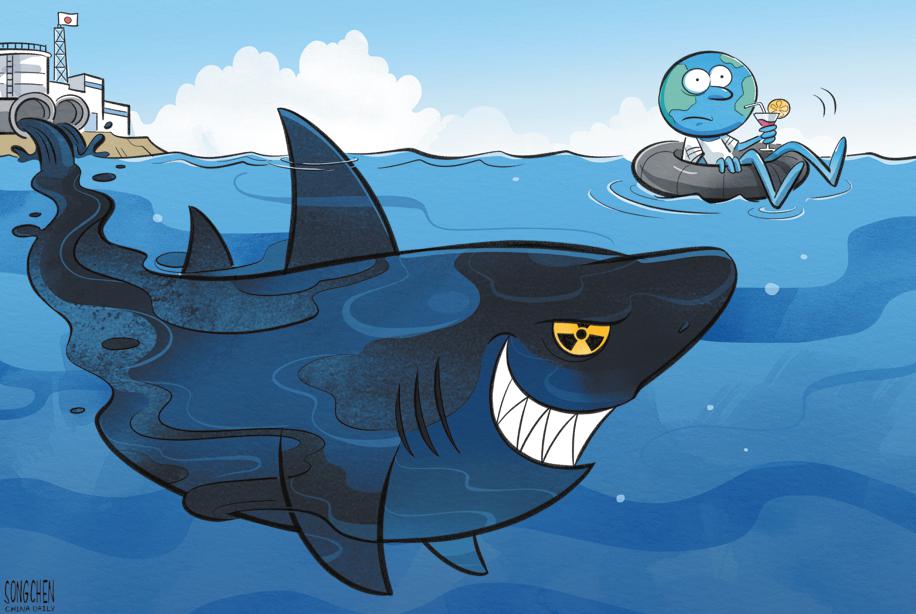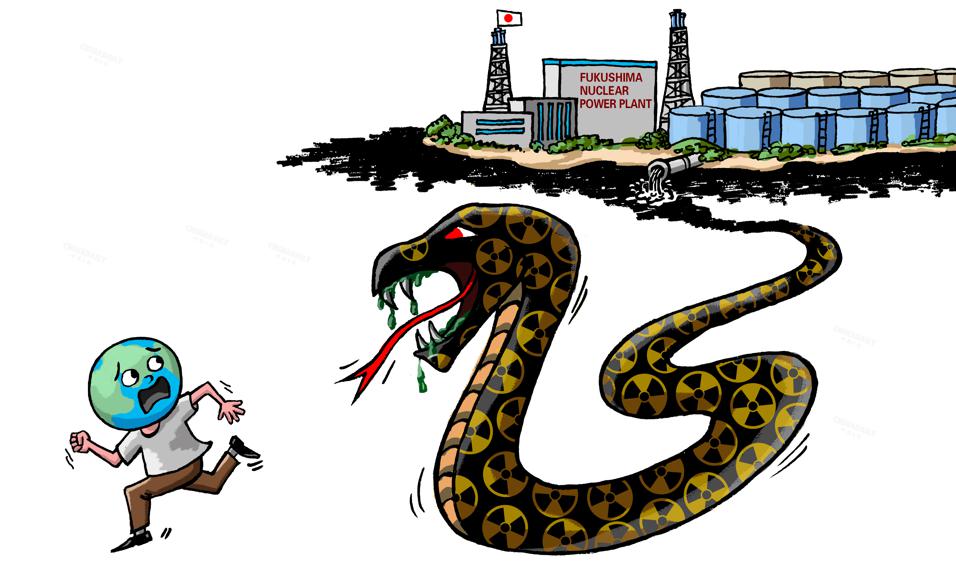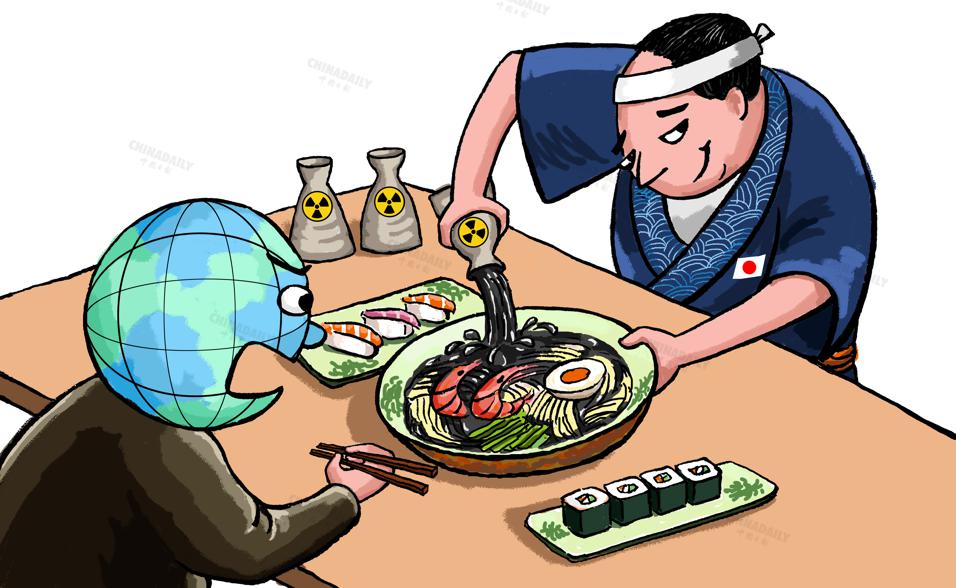Japan threatens planet with radioactive water

Jin Ding/China Daily
Editor's note: The Japanese government, disregarding the safety of its own citizens and people in neighboring countries, has decided to begin discharging nuclear-contaminated water from the damaged Fukushima Daiichi Nuclear Power Plant into the sea from Thursday. Five experts share their views on this issue with China Daily's Zhang Xi and Liu Jianna. Excerpts follow:
Japan has no right to contaminate oceans
According to Tokyo Electric Power Company (TEPCO), it plans to carry out the first round of release over 17 days to discharge 7,800 tons of the radioactive wastewater. The water is collected and partly recycled as cooling water after treatment, with the rest stored in around 1,000 tanks, which is close to 1.37-million-ton capacity.
Japan's decision to release the nuclear-contaminated water from the damaged Fukushima Daiichi Nuclear Power Plant into the Pacific Ocean from Thursday, to put it simply, is reprehensible. Its decision lacks scientific basis and transparency, and could cause untold damage to the marine environment and ecology and thus human health.
To begin with, the Japanese government has not released all the data on the scientific methods and technologies it used to treat the radioactive water to claim it's safe to be dumped into the sea. The sample data cannot prove the safety of all the treated water and can hardly be convincing. The scary fact is that the treated water still contains tritium and other radioactive isotopes such as cesium and strontium that could cause cancer if ingested.
But Japan is using the review report of the International Atomic Energy Agency on July 4 as a "green light" to its plan to discharge the radioactive water into the sea, claiming the treated water is harmless to marine life and humans. By doing so, Japan is trying to shift the responsibility to the IAEA which may cause the agency to bear legal liabilities for Japan's decision.
However, the IAEA report neither supports nor opposes Japan's radioactive water discharge plan; it only says that water discharge plan is the decision of the Japanese government. Also, the Advanced Liquid Processing System which Japan claims to have used to treat the radioactive water cannot remove all the nuclides, which means the radioactive water will contaminate marine life thereby affecting Japan's food exports.
The release of the nuclear-contaminated water into the sea is a threat to the marine environment and ecology, and will damage Japan's international image. And the amount of money Japan would need to spend on efforts to restore its international image will far exceed that required to solve the problem in an eco-friendly ways.
According to general international law and the provisions of the United Nations Convention on the Law of the Sea, Japan should take all possible measures to prevent polluting the marine environment, inform and consult countries that may be affected by its actions, assess and monitor the environmental impact of its actions, and cooperate with the international community to address any sea- or ocean-related problems.
Japan has no right to unilaterally change international law, and create trouble for the international community, especially its neighboring countries. Instead, it should listen to the opinions and suggestions of people both at home and abroad, and desist from contaminating the oceans.
Liu Jiangyong, a professor in the Department of International Relations, Tsinghua University
Selfish action against claim of being responsible

Cai Meng | China Daily
Ignoring the international community's protests, Japan has decided to release the radioactive water from the Fukushima nuclear power plant into the sea. First, no country has dumped such a huge volume of radioactive water into the sea, not to mention Japan's decision to do so is not based on proper, transparent research on the water's ill effects on the marine environment and ecology.
Second, although Japan claims only a small amount of tritium exists in the treated water to be released into the sea, it doesn't mean it will have little impact on marine life. Although the radiation tritium emits is low on energy, its half-life is 12.3 years, meaning it will take 12.3 years for half of its atoms to undergo radioactive decay during which it can easily contaminate all the oceans.
In fact, the radioactive water has more than 60 radionuclides, many of which cannot be effectively treated, and more than 70 percent of the treated water stored in tanks at the Fukushima facility still has radioactive elements that far exceed the regulatory limits for discharge.
Third, TEPCO, which owns the Fukushima facility, has acted irresponsibly in dealing with nuclear pollution, and its claims about the discharge are not credible or verifiable. So its move to release the radioactive water into the sea is very risky.
And fourth, despite having other options to dispose the radioactive water, Japan has chosen the cheapest and easiest way to do so, forcing the international community to bear the vicious ill effects of its action. Japan's selfish decision goes against its claim of being a responsible country.
Liu Litao, an associate professor at the School of International Studies, Nanjing University.
Other countries' loss irretrievable

Song Chen | China Daily
By deciding to release the radioactive water into the sea, Japan has shirked global responsibility, which will not only contaminate the oceans but also deal a serious blow to its fishing industry. The Japanese government has taken advantage of the loopholes in international law to dump the radioactive water into the sea and thus harm the marine environment and ecology, and human health.
It's time the international community came together to prevent Japan from going ahead with its deadly plan of releasing the radioactive water from the Fukushima plant over the next 30 years.
True, the Japanese government has pledge to pay compensation to the domestic seafood industry for any loss they might suffer, but it can't solve the survival problem of industry in the long run. Besides, it will never be able to compensate other countries and their peoples for the loss they would suffer.
Jin Yongming, a professor of maritime laws at Ocean University of China.
A potent threat to people's livelihoods

Zheng Huawei | China Daily
The Japanese government's unilateral decision to release the nuclear-contaminated water lacks scientific validation and international approval. The radioactive water will cripple the seafood industries of Japan and its neighboring countries, especially those of the Republic of Korea and China, because other countries might restrict the import of their seafood, threatening the livelihoods of tens of thousands of people.
China's seafood production in 2022 reached about 34.5 million metric tons, while the ROK's total seafood production volume was 3.6 million metric tons and value about about $7.11 billion. The seafood industries of both countries might suffer a big blow due to Japan's irresponsible action.
Consumer's safety concerns over aquatic products will cause consumption to plummet, and drive up prices of alternative products such as meat. Actually, Japan's action will have a ripple effect on neighboring countries' seafood processing, distribution and cold-chain logistics sectors, undermining the region's economy as a whole.
The impacts of Japan's decision could spill over into the tourism industries of neighboring countries, as international tourists, wary of radiation effects, may choose to not visit Japan or nearby countries.
Japan's decision has cast a long shadow over its international image as a global powerhouse, which will eventually damage the trustworthiness of its businesses.
Woo Jin-hoon, a guest professor at the International Business School, Beijing Foreign Studies University.
A costly lesson for humankind

Zheng Huawei | China Daily
The challenge of disposing nuclear-contaminated water is one that all countries with nuclear power facilities could face in the future. Face-to-face with this problem, Japan is testing the waters, so to speak. But Japan's failure to consult other countries and explore other, safer means to dispose the radioactive water means it is shirking its domestic and international duties.
Past transgressions by Tokyo Electric Power Company, such as data falsification and providing misleading information on the nuclear-contaminated water, have eroded people's trust in it. Addressing this issue is paramount, as the repercussions will impact both national and global interests, and threaten the marine ecosystem and human health. Transparency and scientific objectivity — along with proper monitoring, testing and analysis — are necessary for any decision made in such cases reasonable and acceptable.
A pivotal concern arises from the fact that neither the International Atomic Energy Agency nor the United States has the authority, granted by an international body like the United Nations, to "green light" Japan's water discharge plan.
Therefore, the agreements between the IAEA, the US, and Japan cannot be used as a license to discharge the radioactive water into the sea. While the US might have agreed to Japan's plan due to political reasons, the IAEA's endorsement of the plan has set a hazardous precedent. This could significantly impact future nuclear disaster management protocols, despite the IAEA's promise of continuous expert oversight in Fukushima.
The Japanese authorities' move is a severe violation of the Convention on the Prevention of Marine Pollution by Dumping of Wastes and Other Matter 1972, or the "London Convention" for short, and the United Nations Convention on the Law of the Sea. So both the Japanese government and the IAEA have to address such legal concerns.
There are three major problems with Japan's decision: the accuracy, scientific validity and transparency of data (given TEPCO's history of data manipulation); uncertainties over the short-, medium- and long-term impacts of Japan's action (due to the absence of definitive scientific conclusions); and the violation of international laws and treaties. To address the three problems, the IAEA needs to provide a comprehensive, scientifically sound, impartial and transparent rationale and guarantee.
The release of the radioactive water into the sea will deal a blow to Japan's domestic economy first, but its impact will be beyond the Japan. Japan must earnestly address this issue, as the potential impact of the radioactive water on the marine ecosystem is a matter of global concern.
The development of nuclear disaster management technologies, the choice of methods to deal with a critical problem like this and the adherence to set precedents will decide how such issues will be addressed in the future, and serve as a shared experience and lesson for humankind in its pursuit of peaceful nuclear technology and its preparedness to deal with nuclear accidents.
Zhou Weisheng, a professor at the College of Policy Science at Ritsumeikan University and director of the Research Institute of Global 3E in Japan.
Photos
Related Stories
- We don't want August 24 to become a catastrophic day for the marine environment: FM
- Japan's Fisheries Agency to monitor radioactive materials in fish
- 16 student protesters arrested in S. Korea for attempting to enter Japanese embassy
- S. Korea to keep import ban on Japan's fishery products in place: PM
- Solomon Islands PM condemns Japan's decision to start ocean discharge of nuclear-contaminated wastewater
- Japan's plot to discharge Fukushima nuclear-contaminated wastewater into sea
- Malaysia to screen Japanese food imports following Fukushima nuke wastewater release plan
- Japan's release of treated radioactive water sets bad example: NYT
- Japan starts releasing nuclear-contaminated wastewater into ocean despite opposition home and broad
- Japan's nuclear-contaminated water release "extremely selfish and irresponsible": official
Copyright © 2023 People's Daily Online. All Rights Reserved.









